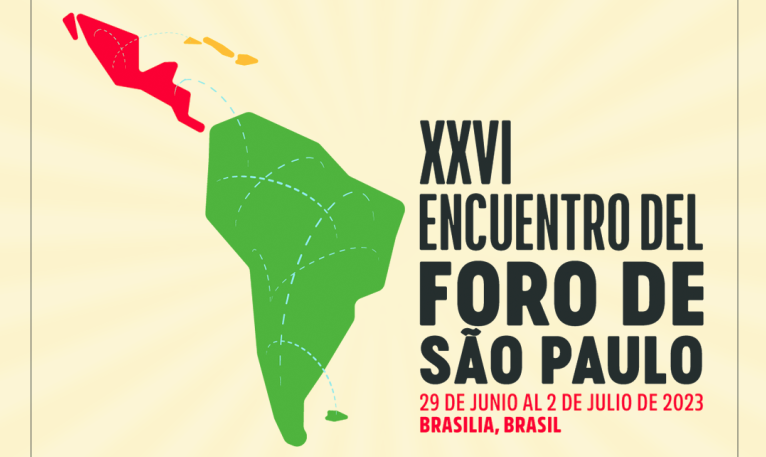
Published 23/06/2023 13:52 | Edited 6/23/2023 5:10 PM
This Friday (23), a press conference of the São Paulo Forum took place online to present the event that takes place from June 29 to July 2, at the Hotel San Marco, in Brasília.
President Lula’s participation in the event is planned, but has not been confirmed, according to Mônica Valente, executive secretary of the São Paulo Forum.
Next Monday (26th) the event website will be launched with the full program and the names of those who will present at the seminars. There is an indication that the event will be broadcast online, even as a way of demonstrating the transparency of what is debated and combating the fake news that they try to attribute to the encounter. The preliminary schedule can be found here.
As Valente explained, there will be around 150 representatives from Latin America and the Caribbean, from the Forum’s member parties, including: Brazil, Argentina, Uruguay, Bolivia Chile, Colombia, Ecuador, Venezuela, Cuba, Panama, Dominican Republic, El Salvador, Nicaragua.
As guests will be approximately 120 representatives from outside Latin America. These nurture political relations and exchanges with the Forum, with parties of the European left, the Socialist Democratic Group of America, Bernie Sanders, parties in Africa, the Communist Party of China, Russia, Laos and Vietnam, among others.
Read too: Foro de São Paulo announces schedule for the 26th. Meeting in Brasilia
In addition, more than 300 subscribers, including PCdoB and PT militants and guests from social, trade union, landless, youth and women movements, will be present to deepen the debate on the strategic axis that is the regional integration of Latin America and the Caribbean.
PCdoB’s secretary of international relations, who participates in the organization of the event, Ana Prestes, considers the Foro de São Paulo “the most important platform for interaction, exchange between parties and social movements in all of Latin America”.
According to Prestes, it is precisely because of the importance of the Forum over so many years that the meeting attracts the attention and cooperation of parties from other countries.
“We will discuss Latin America, which is a territory of peace, one of the few in the world. A place where peoples and their party expressions and movements can talk about a peace agenda, an agenda for economic integration, social integration, urgent integration in so many areas of logistics and infrastructure. They are committed peoples, especially since the end of the 1990s, when the anti-neoliberal struggles matured, which became transformation projects, government projects. So we want these projects to be able to talk more and more and materialize in integration processes”, said the secretary of international relations of the PCdoB.
Pietro Alarcón, representative of the Patriotic Union, the party that makes up the Historic Pact coalition in Colombia, President Gustavo Petro’s base, highlighted that the exchange of experiences is essential for the new Colombian government.
“For us, who took over the leadership of the Colombian executive, since August last year, the exchange of experiences, with other parties in Latin America that led or lead states, as in the case of Brazil, is an extremely relevant exchange. It allows us, based on the exchange of experiences, to generate some initiatives based on this learning”, he said.
“[O debate] it is essential for the moment we are in with president Gustavo Petro and vice president Francia Márquez where we have a challenge, which is the construction of total peace in Colombia. The meeting of the Forum of São Paulo makes it possible to exchange experiences for the conquest of this total peace and for the set of reforms that are fundamental for the path of full democracy and popular participation”, added Alarcón.
Forum Visibility
Regarding the attacks that the São Paulo Forum attracts over the decades, Mônica Valente believes that the meeting will not serve to increase the polarization between left and right in the country.
“We don’t think that holding the Forum will exacerbate or stop exacerbating the polarization. What interests us and ends up happening within the scope of the country that hosts the meeting is to have an approximation with what the Forum truly is, its debates, participants, ideas and we hope with this to contribute to the dissemination of the Forum’s ideas here in Brazil as they are,” he said.
For Ana Prestes, the exploration of what is dealt with by the countries in the Forum shows the relevance that the organization has gained.
“The Forum will be explored because it is an issue that is present in the political debate. It is positive because it shows the relevance of this group of parties and movements that have been focusing on the most complex issues of political, social and economic activity in Latin America and the Caribbean and its dialogue with the world.”
The Colombian Alarcón sees something beyond a left-right confrontation. For him, some sectors of the right embraced economic projects that opposed the popular mass.
“The scenario in Latin America is not a right versus left scenario. It is a confrontation between peoples who want democracy, well-being, happiness, and the projects spread by sectors of the right that have condemned and condemned us through economic projects to marginality and poverty. This is the fundamental confrontation,” he says.
However, he observes that the right in Latin America is experiencing a downturn in the face of the strong resurgence of the left.
“I think the right has cause for concern right now, because now the left has the continental political initiative. There is a set of transformations favorable to the left that have taken place across very broad fronts of unity.”
Also participating in the conference were Jorge Drkos, from the Transversal Front of Argentina and coordinator of the Forum’s communication and social networks group, and Romênio Pereira, secretary of international relations for the PT.
Source: vermelho.org.br

